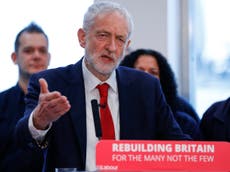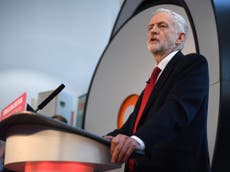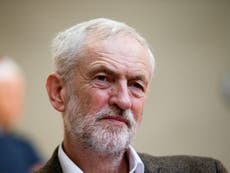Jeremy Corbyn's Brexit campaign began with an honest lie. Now the whoppers are too big to keep a lid on
Corbyn’s latest Brexit ploy is to tell the public to forget about it and move on, and who better to help them do it than a man who never cared about it in the first place?

It’s best to think of Jeremy Corbyn as the fat cat head of some failing aid charity that’s being kept in business solely by Brexit. But for the earthquake of 23 June 2016, it would have folded long ago. Now he is twiddling his thumbs, waiting for the inevitable tsunami that follows it – the humanitarian disaster that he and he alone can sweep in to sort out from behind the wheel of his Land Rover.
Before we get on to his “big” Brexit speech, in a factory in Wakefield on Thursday morning, it is worth returning to the very first words he had to say on the subject.
In April 2016, he launched Labour’s Remain campaign from the University of London’s Senate House, a building that is the subject of a well known piece of trivia.
“Of course, this is where George Orwell based his novel Nineteen Eighty-Four. This building was the Ministry of Truth,” he told his audience, before pausing briefly and inclining his head for comic effect. “Let us see.”
It is no disservice to the man, nor to misrepresent him, to say what he clearly meant by that remark. It was, arguably, an admirably honest way to acknowledge he had been one of the country’s leading Eurosceptics for 30 years. There were countless Eurosceptic things he had said and done that were a matter of public record. But now he was leader of the Labour Party, an explicitly pro-European organisation, and so he would have to lead his party’s campaign to remain in the EU.
It would, he was acknowledging, be a tricky couple of months for him personally, but the country would surely vote Remain, and the whole thing could be quickly forgotten.
Oh what a tangled web we weave, when first we practice to deceive. Now, two and half years later, as we reach Brexit’s panic hours, Jeremy Corbyn is positively cocooned in his own sticky little web of lies.
On Thursday morning, we learned that it doesn’t matter if you voted Leave or Remain, your problems are all the same.
“If you’re living in Tottenham you may well have voted to Remain,” he said. “You’ve got high bills, rising debts. You’re in insecure work. You struggle to make your wages stretch and you may be on universal credit, and forced to access food banks. You’re up against it.”
And guess what?
“If you’re living in Mansfield, you are more likely to have voted to Leave. You’ve got high bills, rising debts, you’re in insecure work, you struggle to make your wages stretch and you may be on universal credit and forced to access food banks. You’re up against it.”
Now, he explained, is the time to just forget about Brexit and move on. Concentrate on what matters. There are bigger problems out there. Austerity. Poverty. Food banks.
And who better to do just that than a guy who, when asked on Channel 4’s The Last Leg how much he cared about remaining in the European Union, in the middle of his most high profile media appearance of the whole campaign, replied, “Oooh, seven out of 10?”
He had Laura Pidcock there to introduce him, the young, Corbynista MP for North West Durham, who was only too glad to tell the audience that Brexit was no big deal.
“While many in the Westminster bubble seem only able to focus on Brexit and the Leave/Remain divide, we know that up and down the country, in the real world there are crucial issues that we must address,” she said.
“Issues like child poverty becoming entrenched in the UK. Families living on food banks becoming the norm.”
It is boring to have to say that the Westminster “bubble” is obsessed with Brexit because all these questions follow after it. Brexit stands ready to deliver a major shock to the economy, that will make all these social problems so much more deeply ingrained, and so much harder to solve.
Corbyn spelled out in great detail how the Tory party is not fit to govern, how the failure of Theresa May’s Brexit deal should spell the end of that party as a party of government. And then, in his next breath, pleaded with Remainer Tories to help them bring down their own government. Let’s see how that pans out.
This entry level dissemblance was barely the start of it, however. Later on, Corbyn would have the sheer bravura to tell his audience how, “I meet people who are frightened at the prospect of no deal.” One wonders how these people, frightened of a no-deal scenario, react to the sight of Jeremy Corbyn, who is currently doing all he can to prevent a deal being done, weaponising the risk of it to propel him to Downing Street.
He outlined, yet again, how he would do things differently. How he would “negotiate urgently” with the European Union, to achieve a Brexit deal that would “give the UK a say in future EU trade deals”. And how he would achieve “a strong single market relationship”.
These promises oscillate between meaninglessness and downright impossibility, and the longer he clings on to them, like a drunk passenger in the Titanic control room, preventing the captain from steering away from the iceberg, the more certain the chance of disaster becomes.
No one even knows what the next chapter of the Brexit story will be, never mind its ending. But we can look back to the beginning, and the narrative arc of the Corbyn character, which began with an honest lie it can no longer sustain. Something, at some point, has to collapse.






Join our commenting forum
Join thought-provoking conversations, follow other Independent readers and see their replies